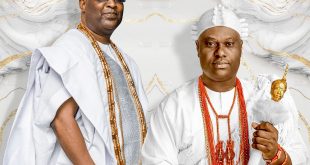How to Enter Saint Kitts and Nevis, Dominica, Fiji and More without Visa
 It is important that after working through the year, one should take a break and rest, findings however showed that the time to rest in most cases for Nigerians are usually used in working, it was based on this that many would rather travel outside their state of residents or even the country.
It is important that after working through the year, one should take a break and rest, findings however showed that the time to rest in most cases for Nigerians are usually used in working, it was based on this that many would rather travel outside their state of residents or even the country.
The issue with travelling out of the country is the time it takes to process the traveling document and availability of countries to visit, in this write-up we will be exposing our readers to some countries Nigeria can enter without visa, how long they can stay, the airlines plying those countries and many more.
Below are some countries Nigerian passport holder did not require visa or any other travelling document to visit…
Cape Verde
Stay Duration: 3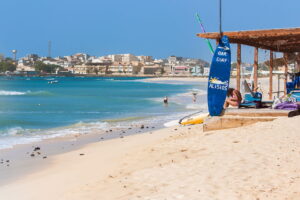 0 days
0 days
Cape Verde or Cabo Verde, officially the Republic of Cabo Verde, is an archipelago and island country in the central Atlantic Ocean, consisting of ten volcanic islands with a combined land area of about 4,033 square kilometres.
Entry Requirements
Nigeria passport holders can get Cape Verde for a period of 30 days without the need for a visa.
Nigeria citizens hoping to travel to Cape Verde must register online, preferably five days prior to their arrival to Cape Verde.
An airport Security Tax of CVE 3400 is levied on tourists arriving in Cape Verde.
Intending visitors are required to have a passport valid for a minimum of 6 months from the date of arrival in Cape Verde. The passport should have two blank pages for visa stamping.
Travellers under the age of 18 must show travel authorization from their parents or guardians.
Tourists travelling to Cape Verde must provide proof of a confirmed means of accommodation for their entire stay in Cape Verde. This could be in the form of a sponsor letter from a host living in the country or a hotel reservation.
Visitors are required to show proof of enough funds to spend during their in Cape Verde.
Prospective visitors can get to Cape Verde from any international airport in Nigeria. There are international airports in Lagos and Abuja.
British Airways, Ethiopia Airways, Air Europa, and Royal Air Maroc are some of the carriers that fly from Kenya to Cape Verde.
The estimated flight time from Lagos to Praia, Cape Verde is 18 hours, 20 minutes and from Abuja, it is 17 hours, 5 minutes.
The Cape Verdean Escudo is the official currency used in Cape Verde. Visitors can exchange their foreign currency at various banks and exchange outlets in the country.
The official language of Cape Verde is Portuguese. But the unofficial one, which is spoken by most ( if not all) is the Cape Verdean Creole, which is also known as kabuverdianu or simply called Creole or Kriolu.
Cape Verde’s subtropical climate makes year-round travel pleasant and enjoyable. August is the hottest month in Cape Verde, and the coldest is January.
Fogo, Sal, Palmeira and Santa Maria are facinating places in Cape Verde Tourists can visit.
While Cape Verde is home to diverse religious demography, Christianity is currently the religion practised by a vast majority of Cape Verde’s population.
Visitors can move around in Cape Verde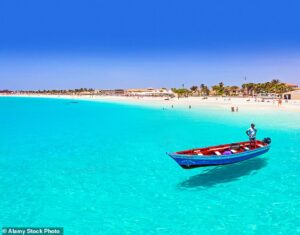 with minibuses, taxis, boats and planes.
with minibuses, taxis, boats and planes.
Canja, catchupa, morreia and percebes are some of the dishes tourists can enjoy while in Cape Verde.
The Time zone in Cape Verde is (GMT-1), which puts Nigeria two hours ahead in time.
The power and socket plug used in Cape Verde are of Type C and F. The standard voltage is 230 V and the standard frequency is 50 Hz.
Cape Verde is a small country and very difficult to spot on a world map, but the country has a lot to offer. Each island serves a different set of attraction and reasons to visit the region.
COOK ISLANDS
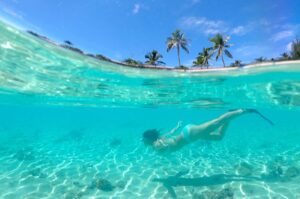 The Cook Islands is a nation in the South Pacific, with political links to New Zealand. Its 15 islands are scattered over a vast area. The largest island, Rarotonga, is home to rugged mountains and Avarua, the national capital. To the north, Aitutaki Island has a vast lagoon encircled by coral reefs and small, sandy islets. The country is renowned for its many snorkeling and scuba-diving sites.
The Cook Islands is a nation in the South Pacific, with political links to New Zealand. Its 15 islands are scattered over a vast area. The largest island, Rarotonga, is home to rugged mountains and Avarua, the national capital. To the north, Aitutaki Island has a vast lagoon encircled by coral reefs and small, sandy islets. The country is renowned for its many snorkeling and scuba-diving sites.
DO I NEED A PERMIT TO TRAVEL TO THE COOK ISLANDS?
No. All visitors wishing to visit the Cook Islands will be issued a visitors permit on arrival into the Cook Islands, provided they meet the following entry requirements:
All international passport holders must have a passport valid for a period of at least 6 months beyond their intended period of stay in the Cook Islands.
All New Zealand passport holders are allowed stay of up to 90 days in the Cook Islands. All other international passport holders are eligible for a stay of up to 31 days.
You must have evidence of a valid outbound ticket or return ticket to your port of origin.
Languages
WHAT ARE THE OFFICIAL LANGUAGES OF THE COOK ISLANDS?
The official languages of the Cook Islands are Cook Islands Maori and English. English is widely spoken on the island of Rarotonga. While Cook Islands Maori is predominantly used in the outer islands (Pa Enua) of the Cook Islands.
AIRLINES
Hawaiian AirlinesHawaiian Airlines
Air New ZealandAir New Zealand
Singapore AirlinesSingapore Airlines
JetstarJetstar
Air TahitiAir Tahiti
Fiji
Stay Duration: 120 days
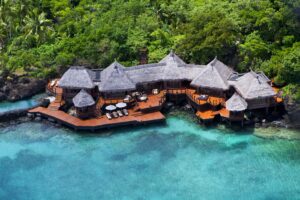 Fiji, a country in the South Pacific, is an archipelago of more than 300 islands. It’s famed for rugged landscapes, palm-lined beaches and coral reefs with clear lagoons. Its major islands, Viti Levu and Vanua Levu, contain most of the population. Viti Levu is home to the capital, Suva, a port city with British colonial architecture. The Fiji Museum, in the Victorian-era Thurston Gardens, has ethnographic exhibits.
Fiji, a country in the South Pacific, is an archipelago of more than 300 islands. It’s famed for rugged landscapes, palm-lined beaches and coral reefs with clear lagoons. Its major islands, Viti Levu and Vanua Levu, contain most of the population. Viti Levu is home to the capital, Suva, a port city with British colonial architecture. The Fiji Museum, in the Victorian-era Thurston Gardens, has ethnographic exhibits.
Entry Requirements
The visa policy in Fiji permits Nigerians to visit without the need for a visa for up to 120 days.
Tourists who want to stay beyond the 120-day validity period can apply for a visa extension at the immigration department for a fee.
Intending visitors must have a passport valid for six months from the date of arrival in Fiji. It is recommended that this passport has at least two blank pages for entry and exit stamp.
Tourists are required to have a return or onward ticket and proof of enough funds to spend during their stay in the country.
Requisite fee ($F98) will also be requested for during immigration clearance. This fee is not required if visitors are visiting for medical treatments or are yacht owners, because yacht owners or members of a crew of a carrier will have paid for the permit before arrival.
Tourists travelling to Fiji must provide proof of a confirmed means of accommodation for their entire stay in Fiji. This could be in the form of a sponsor letter from a host living in the country or a hotel reservation.
Fiji has listed a number of countries that cannot bring in pet and Nigeria is one of them.
Persons under the age of 18 and travelling without a parent or guardian must present a copy of their birth certificate and a parental consent form. This form must be duly completed and signed by the parent or guardian.
Prospective visitors hoping to travel to Fiji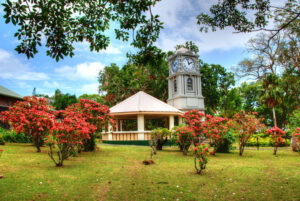 can do so from any international airport in Nigeria. There are international airports in Lagos and Abuja.
can do so from any international airport in Nigeria. There are international airports in Lagos and Abuja.
Emirates Airline, Fiji Airways and Qatar Airways are some of the carriers that fly from Nigeria to Fiji.
The estimated flight duration from Lagos to Suva, Fiji is 1 day, 8 hours and from Abuja, it is 1 day, 12 hours.
Though others (Islam and Hinduism) exist, Christianity is the dominant religion in Fiji.
Fiji has a warm and tropical climate all year round. The best time to visit fiji is from mid-October to mid-November when prices are fair, and the beaches and tourists sites are packed with fewer crowds. This is also when the weather conditions are dry, calm and enjoyably warm.
Fiji’s numerous natural beauties and endowments put it out as a great place for tourists and visitors looking to experience the richness of nature and to discover new cultures.
There are three official languages in Fiji, which are English, Fijian and Hindi.
The Fijian dollar is the official currency of Fiji. ATMs can easily be found in major parts of Fiji and credit/debit cards are accepted by many business outlets in Fiji. Visitors can change their foreign currency at banks and various exchange outlets.
Popular Fiji dishes tourists can try while in the country are kokoda, rourou, lovo, etc.
Fiji uses the Fiji Standard Time (GMT+12), which puts Fiji eleven hours ahead of Nigeria.
Power sockets and plugs used in Fiji are of type I. The standard supply voltage is 240 V, with a standard frequency of 50 Hz.
A tourist in Fiji spends an average of FJD$360 per day.
Visitors are expected to be courteous and conscious of existing rules and customs as they go about their tourism-related activities.
Dominica
Stay Duration: 180 days
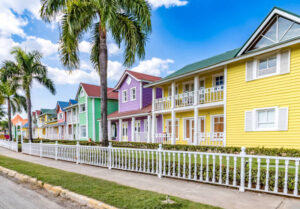 Dominica is a mountainous Caribbean island nation with natural hot springs and tropical rainforests. Morne Trois Pitons National Park is home to the volcanically heated, steam-covered Boiling Lake. The park also encompasses sulphur vents, the 65m-tall Trafalgar Falls and narrow Titou Gorge. To the west is Dominica’s capital, Roseau, with colorful timber houses and botanic gardens.
Dominica is a mountainous Caribbean island nation with natural hot springs and tropical rainforests. Morne Trois Pitons National Park is home to the volcanically heated, steam-covered Boiling Lake. The park also encompasses sulphur vents, the 65m-tall Trafalgar Falls and narrow Titou Gorge. To the west is Dominica’s capital, Roseau, with colorful timber houses and botanic gardens.
Entry Requirements
For a duration of 180 days, Nigerians can visit Dominica without a visa.
A passport valid for at least six (6) months from the expected date of entry into Dominica, is also a basic requirement. The passport should have at least two blank pages for visa stamping.
Tourists are required to have a return or onward ticket and proof of enough funds to spend during their stay in Dominica.
A detailed printed itinerary of your time in Dominica and a confirmation of accommodation during the stay are needed.
An airport tax of USD 21 is levied on Nigerians when exiting Dominica.
Intending visitors can get to Dominica from any international airport in Nigeria. These international airports can be found in Lagos and Abuja.
Lufthansa, Air France, British Airways and Air Cote D’Ivoire are some of the carriers that fly from Nigeria to Dominica.
The estimated flight time from Lagos to Roseau, Dominica is 23 hours, 55 minutes and 1 day from Mombasa.
The official and most spoken language in Dominica is English. Some regions in Dominica speak a dialect called Kokoy.
Christianity is the prominent religion in Dominica. They consist majorly of Roman Catholics and Protestants. Islam, Buddhism, Baha’i, Hinduism make up the minority.
The Eastern Caribbean dollar is the official currency in Dominica. Tourists can exchange their foreign currencies at banks and other exchange outlets in the country.
As you travel to Dominica, be ready to spend on average between $60-$200 per day as a tourist.
Dominica has a tropical climate. It is usually hot and humid all year round, with a relatively cool and dry season from January to mid-April and a hot, humid and rainy season from mid-June to mid-November.
Some of the special delicacies tourists can try while in Dominica include manicou, sorrel, codfish sandwich and rum.
Transportation in Dominica can be facilitated by taxis, car rentals and buses.
Dominica uses the Atlantic Standard Time (GMT-4) which puts Nigeria 5 hours ahead of Dominica.
(GMT-4) which puts Nigeria 5 hours ahead of Dominica.
The best time to visit Dominica is from March to May when the peak season rush trickles out of the city.
Type D and G are the power and socket plug types used in Dominica. The standard voltage is 230 V and the standard frequency is 50 Hz.
Tourists are advised to follow the instructions of local authorities and also monitor local news broadcasts while in the country.
Haiti
Stay Duration: 90 days
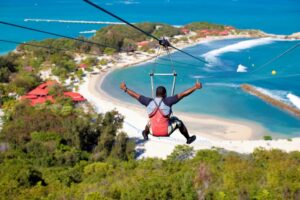 Haiti is a Caribbean country that shares the island of Hispaniola with the Dominican Republic to its east. Though it’s still recovering from a 2010 earthquake, many of Haiti’s landmarks dating to the early 19th century remain intact. These include Citadelle la Ferrière, a mountaintop fortress, and the nearby ruins of Sans-Souci Palace, the baroque former royal home of King Henry I.
Haiti is a Caribbean country that shares the island of Hispaniola with the Dominican Republic to its east. Though it’s still recovering from a 2010 earthquake, many of Haiti’s landmarks dating to the early 19th century remain intact. These include Citadelle la Ferrière, a mountaintop fortress, and the nearby ruins of Sans-Souci Palace, the baroque former royal home of King Henry I.
Entry Requirements
Nigerians citizens can visit Haiti for a period of 90 days without a visa.
Visitors who desire to stay longer than the 90-day period are to apply and pay for an extension at the immigration department in Haiti
Intending visitors are required to have a passport valid for a minimum of 6 months beyond the date of their arrival in Haiti.
All Nigerians travelling to Haiti must pay a tourist fee set at $10.00 on arrival at the airport.
Visitors are required to provide proof they have sufficient funds to cover their entire stay in Haiti. An onward or return ticket is also necessary, as well as proof of a confirmed means of accommodation for the stay in Haiti.
Nigerians visiting Haiti with pets must have a veterinary health certificate and proof of rabies vaccination.
On entry into Haiti, tourists with amounts exceeding $10,000 will have to declare it on arrival.
Although there are no direct flights from Nigeria to Haiti, intending visitors can get to Haiti from international airports in Nigeria. There are international airports in Lagos and Abuja.
Virgin Atlantic, Delta, Air France, British Airways and RwandAir are some of the carriers that fly from Nigeria to Haiti.
Christianity, precisely Roman Catholicism, is the official religion of Haiti, with about 80% of the entire population practising it. However, a large majority of Haitians believe in and practice at least one aspect of voodoo.
The estimated flight duration from Lagos to Port-au-Prince, Haiti is 21 hours, 4 minutes and from Abuja, it is 1 day, 4 hours.
The official currency of Haiti is the Haitian Gourde, although the USD is also widely accepted. Visitors can exchange their foreign currency at various banks and exchange outlets in the country.
Tourists are advised to budget between $60-$75 to spend per day while in Haiti.
The Haitian Creole (Kreyòl) and French are the official languages of Haiti.
Haiti has a hot and humid tropical climate. The north wind brings fog and drizzle, which interrupt Haiti’s dry season from November to January. But from February to May, the weather is very wet. Northeast trade winds bring rains during the wet season.
November to March is the best time to visit Haiti because the temperatures are much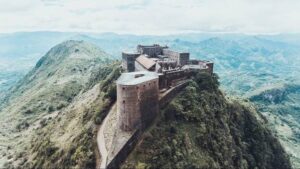 cooler and perfect for relaxing in the beaches.
cooler and perfect for relaxing in the beaches.
Some of the delicacies tourists can enjoy in Haiti include poulet aux noix (chicken and cashew nuts), mayi moulen ak sòs pwa, poul an sòs (cornmeal with beans and stewed chicken), griyo (fried pork), lanbi an sòs lanbi kreyol (conch in creole sauce), lanbi boukannen and woma boukannen (grilled conch and lobster).
The hurricane season in Haiti lasts from June to the end of November; tourists are advised to plan their trip cautiously.
Haiti uses the Eastern Daylight Time (GMT- 4), which means Nigeria is five hours ahead in time.
The power and socket plug used in Haiti are of Type A and B. The standard voltage is 110 V and the standard frequency is 60 Hz.
Movement in Haiti is possible with buses, taxis and car rentals.
Mauritius
Stay Duration: 14 days
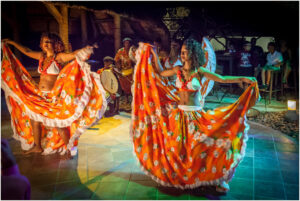 Mauritius, an Indian Ocean island nation, is known for its beaches, lagoons and reefs. The mountainous interior includes Black River Gorges National Park, with rainforests, waterfalls, hiking trails and wildlife like the flying fox. Capital Port Louis has sites such as the Champs de Mars horse track, Eureka plantation house and 18th-century Sir Seewoosagur Ramgoolam Botanical Gardens
Mauritius, an Indian Ocean island nation, is known for its beaches, lagoons and reefs. The mountainous interior includes Black River Gorges National Park, with rainforests, waterfalls, hiking trails and wildlife like the flying fox. Capital Port Louis has sites such as the Champs de Mars horse track, Eureka plantation house and 18th-century Sir Seewoosagur Ramgoolam Botanical Gardens
Entry Requirements
Nigerians hoping to travel to Mauritius can get a visa on arrival into the country.
This visa on arrival permits Nigerians to stay for a duration of 14 days.
Prospective visitors must have a passport valid for at least 6 months at the time of entry into Mauritius. The passport should have at least one blank page for visa stamping.
Tourists are required to have a return or onward ticket and proof of enough funds to spend during their stay in Mauritius.
Confirmation of accommodation during their stay in Mauritius is also required.
Nigerians importing and exporting the local currency (Mauritian Rupee) and foreign currencies which amounts exceed MUR 500,000 or equivalent in foreign currencies must be declared before entry into the country.
Intending visitors can get to Mauritius from any international airport in Nigeria. There are international airports in Lagos and Abuja.
Kenya Airways, British Airways, EgyptAir and Air Mauritius are some of the carriers that fly from Nigeria to Mauritius.
The estimated flight duration from Lagos to Port Louis, Mauritius is 11 hours, 30 minutes and from Abuja, it is 19 hours, 40 minutes.
Mauritius has a mild tropical maritime climate throughout the year. The country has two seasons, which are a warm humid summer from November to April and a relatively cool dry winter from June to September, which is the best time to travel.
Mauritius is a multilingual country with no official language. Citizens speak various languages ranging from English, French, Mauritian Creole, French-based Creole, and ethnic languages such as Hindi, Telugu, Tamil, Malayalam, Marathi, Urdu and Tamil or Mandarin.
The Mauritian Rupee is the official and only currency used in Mauritius. Visitors can exchange their foreign currencies at various bank and exchange outlets in the country.
In Mauritius, Hinduism is the major religion with about half of the entire population practising the religion. Christianity, Islam Buddhism are other religions present in the country.
Popular delicacies in Mauritius are dholl pori, dim sum, daube de poulet and bol renverse.
Tourists are advised to budget about $68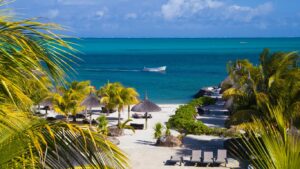 for daily expenses for their stay in Mauritius.
for daily expenses for their stay in Mauritius.
In Mauritius, the power plugs and sockets are of type C and G. The standard voltage is 230 V and the standard frequency is 50 Hz.
Mauritius uses Mauritius Standard Time (GMT+4). which puts Nigeria 3 hours behind in time.
Transportation in Mauritius can be done through buses, car rentals, taxis, trains etc.
Tourists are advised to follow the instructions of local authorities and also monitor local news broadcasts while in the country.
Saint Kitts and Nevis
Stay Duration: 90 days
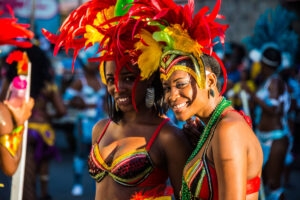 Saint Kitts and Nevis is a dual-island nation situated between the Atlantic Ocean and Caribbean Sea. It’s known for cloud-shrouded mountains and beaches. Many of its former sugar plantations are now inns or atmospheric ruins. The larger of the 2 islands, Saint Kitts, is dominated by the dormant Mount Liamuiga volcano, home to a crater lake, green vervet monkeys and rainforest crisscrossed with hiking trails.
Saint Kitts and Nevis is a dual-island nation situated between the Atlantic Ocean and Caribbean Sea. It’s known for cloud-shrouded mountains and beaches. Many of its former sugar plantations are now inns or atmospheric ruins. The larger of the 2 islands, Saint Kitts, is dominated by the dormant Mount Liamuiga volcano, home to a crater lake, green vervet monkeys and rainforest crisscrossed with hiking trails.
Entry Requirements
Nigerians visiting Saint Kitts and Nevis can stay for a period of 90 days visa free.
Nigerians visiting Saint Kitts and Nevis require a passport valid for six months and must carry blank spaces for stamps.
Nigerians visiting Saint Kitts and Nevis should have sufficient money to cover for the length of their visit.
Visitors are also required to have their return tickets and all document relevant to their onward reservations.
Visitors interested in extending their stay are expected to contact the Ministry Of Finance.
Travelling to Basseterre, Saint Kitts and Nevis from Lagos will require a stopover in Atlanta, USA.
Nigerians visiting Saint Kitts and Nevis with pets must have an import permit, veterinary certificate and proof of rabies vaccination.
Nigerians visiting Saint Kitts and Nevis must check for hepatitis A, hepatitis B, typhoid, yellow fever, rabies, meningitis, polio, measles, mumps and rubella (MMR), Tdap ), chickenpox, shingles, pneumonia and influenza vaccination.
Connecting flights between Lagos and Saint Kitts and Nevis typically lasts for about 10 hours.
While Saint Kitts and Nevis is home to a diverse religious demography, Christianity is currently the religion practiced by a vast majority of Saint Kitts and Nevis population.
The exchange rate between the Nigerian Naira and the East Caribbean Dollar is currently at 1 NGN = 0.0075 XCD.
Because the time zone currently in use in Saint Kitts and Nevis is the Atlantic Standard Time ( GMT-4 ), Saint Kitts and Nevis is 5 hours ahead of Nigeria.
Getting around in Saint Kitts and Nevis is possible with the various public means of transportation available, this includes buses, (fares usually cost between cost EC$2.50 to EC$5), taxis, ferries and car rentals.
Saint Kitts and Nevis uses a type D and G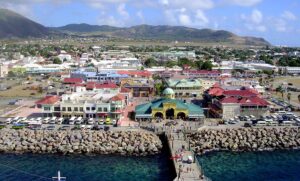 adapter for visitors travelling with chargeable devices.
adapter for visitors travelling with chargeable devices.
The climate in St.Kitts and Nevis is tropical, hot and humid all year round, with a relatively cool, dry season from January to mid-April and a hot, humid and rainy season from mid-June to mid-November.
The best time to visit St.Kitts and Nevis is in May and June, when hotels lower their rates to lure in travelers and the winter crowds thin out.
English is the official language spoken in Saint Kitts and Nevis.
Vanuatu
Stay Duration: 30 days
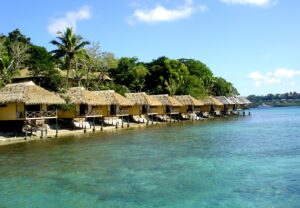 Vanuatu is a South Pacific Ocean nation made up of roughly 80 islands that stretch 1,300 kilometers. The islands offer scuba diving at coral reefs, underwater caverns and wrecks such as the WWII-era troopship SS President Coolidge. Harborside Port Vila, the nation’s capital and economic center, is on the island of Efate. The city is home to the Vanuatu National Museum, which explores the nation’s Melanesian culture.
Vanuatu is a South Pacific Ocean nation made up of roughly 80 islands that stretch 1,300 kilometers. The islands offer scuba diving at coral reefs, underwater caverns and wrecks such as the WWII-era troopship SS President Coolidge. Harborside Port Vila, the nation’s capital and economic center, is on the island of Efate. The city is home to the Vanuatu National Museum, which explores the nation’s Melanesian culture.
Entry Requirements
The Government of Vanuatu allows nationals of Nigeria to visit their country for a duration of 30 days without a visa.
Citizens of Nigeria who wish to stay longer than the 30-day validity period are to apply and pay for an extension at the Offices of Immigration in Vanuatu.
Intending visitors are required to have a passport valid for a minimum of 6 months beyond their date of arrival into Vanuatu. The passport should have at least two blank pages for visa stamping.
Nigerians travelling to Vanuatu must provide proof of a confirmed means of accommodation for their entire stay in Vanuatu. This could be in the form of a sponsor letter from a host living in the country or a hotel reservation.
Nigerians visiting Vanuatu with pets must have an import Permit from the Vanuatu Quarantine & Inspections Service and a health certificate.
A return ticket to Nigeria or onward destination is needed as well.
On entry and exit into Vanuatu, tourists with amounts above VUV 1,000,000 will be required to declare it.
Travellers can get to Vanuatu from international airports in Nigeria. There are international airports in Lagos and Abuja.
Qatar Airways, EgyptAir and Fiji Airways are some of the airlines that fly from Nigeria to Vanuatu.
The estimated flight time from Lagos to Port Vila, Vanuatu is 1 day, 10 hours and from Abuja, it is 1 day, 13 hours.
The constitution of Vanuatu guarantees freedom of religion. Christianity is the dominating religion in Vanuatu. However, other religions like Baha’i faith, Buddhism, Hinduism and Islam are present in the country.
Vanuatu Vatu is the official currency used in Vanuatu. Visitors can various banks and exchange outlets in the country to exchange their foreign currencies.
Mt. Yasur Volcano, Port Villa, Luganville and Mt. Benbow and Mt. Marum are some of the tourist sites in Vanuatu that tourists can visit.
English, French, and Bislama are the three official languages of Vanuatu. However, Bislama, which is an English Creole is the most spoken language in the country.
Vanuatu has a tropical and sub-tropical climate. Summer can be hot, wet and humid, and it is from November to March, while winter is from April to October.
Tourists are advised to budget about $60 to spend on daily expenses while in Vanuatu.
Special delicacies tourists can try while in Vanuatu are Flying fox, Wild pigeon, Santo beef and Poulet fish.
Vanuatu uses Vanuatu Standard Time (GMT+11), which puts Nigeria 10 hours behind in time.
The power and socket plug used in Vanuatu are of Type I. The standard voltage is 220 V and the standard frequency is 50 Hz.
Movement in Vanuatu is possible with a pickup truck, bicycle and small boats.
Visitors travelling to Vanuatu are expected to be courteous and conscious of existing rules and customs as they go about their tourism-related activities.
 SocietyGazette.com Society Gazette News
SocietyGazette.com Society Gazette News



